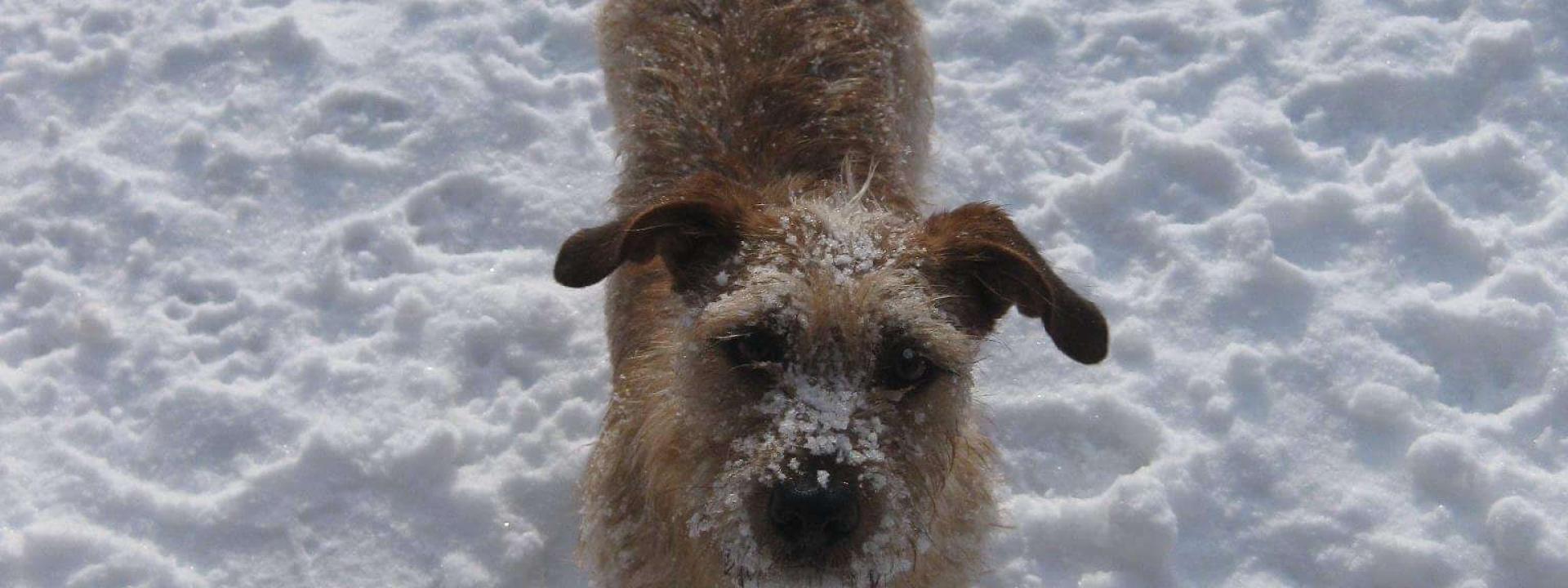Brr! Frost is in the air, and we humans aren’t the only creatures who feel it. Here are some tips to keep our pets comfortable, healthy, and safe through the winter. Please do keep in mind that each animal is unique, and some of our pets may need more TLC to get them through the cold weather than others.
Keeping Pets Safe
-
Mind the paws! Paws in the winter are at risk of freezing, erosions from road salt, pain from clumped ice and snow, and torn nails. It may be helpful to put booties on your pup’s feet to decrease contact with cold surfaces, ice, snow, and road salt. You can alternately consider applying a waxy product like Musher’s Secret to your dog’s paws to provide a protective barrier against harsh conditions.
 Plan to trim nails short and trim fur between toes to reduce the risk of torn nails and snowball clumps. After coming indoors from a walk, make sure to always wipe your dog’s paws to remove any salt or clumps of snow from them.
Plan to trim nails short and trim fur between toes to reduce the risk of torn nails and snowball clumps. After coming indoors from a walk, make sure to always wipe your dog’s paws to remove any salt or clumps of snow from them. -
Be mindful of slippery surfaces when your dog is walking, running, or playing outdoors. Dogs are at risk of slipping on ice just like we are, and slips can lead to muscle strains, sprains, torn ACLs, and even broken bones.
-
Some dogs become chilly outdoors just from having short coats and exposed skin. There are numerous dog sweaters and vests that can be helpful for keeping your pup comfortable in the cold weather.
-
The days are mighty short this time of year, which leaves us with limited daylight hours to walk our dogs. Clip-on lights and reflective accessories can help increase visibility to others during night time walks.
Staying Inside?
-
If you and/or your pet prefer to spend more time indoors during the colder months, plenty of opportunities still exist to keep your dog or cat stimulated mentally and physically. For dogs, consider scent games, food puzzles, and training your pup new tricks as methods to keep that brain and body working indoors. For cats, consider strategically placing bird feeders outside of windows, food puzzles, and increased play time with toys and laser pointers.
-
Pets can become chilly even inside of your house. As a general standard, it is best to maintain the indoor house temperature at a minimum of 60 degrees Fahrenheit to keep your creatures comfortable. Never keep your pets outdoors for extended periods of time without having access to a warm, protected area when they need it.
-
Dogs can develop a cough or dry, itchy skin due to the dry indoor air provided by some heaters and wood stoves. Consider increasing humidity by adding a humidifier, and consider adding a fish oil supplement like Welactin to improve your dog or cat’s coat quality. If these simple solutions do not resolve your pet’s symptoms, schedule an appointment with your veterinarian to assess whether additional diagnostics or treatment are recommended.
Potential Winter Toxins
-
When de-icing your own driveway and walkways, use sand or a nontoxic salt alternative to avoid road salt, which can be very harsh and painful for your pup’s paws.
-
Antifreeze is a common product to use in cars in the winter, but it is severely toxic to cats and dogs if consumed. It can cause acute kidney failure and death. Watch out for antifreeze leaks or open containers, particularly because it tastes sweet and is therefore appealing to pets. If you suspect that your pet licked any amount of antifreeze, bring them to your veterinary clinic or an animal emergency hospital immediately.
Winters here in Maine can be long and quite chilly. Hopefully these tips will keep you and your pup safe and happy until Spring arrives!

